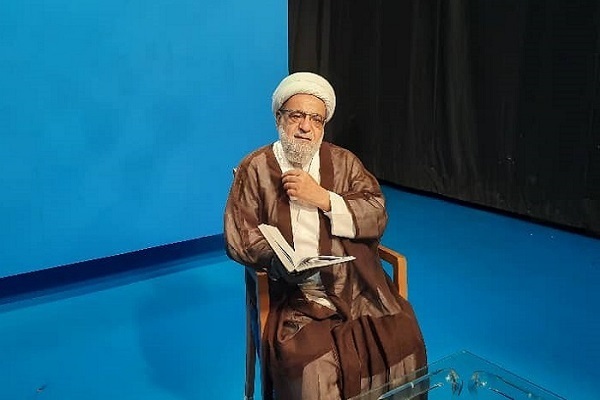AhlulBayt News Agency: The event of Ghadir is a source of Muslim unity as the Holy Prophet (PBUH) and all his companions were present there, a senior lecturer at Qom Seminary says.
Ghadir represents one of the most apparent instances of Muslim unity, Ayatollah Najm-al-din Tabasi said while addressing a conference about Ghadir on Thursday.
“Those advocating for unity among Muslims should refer to Ghadir, where despite their differences in opinions and preferences, all the Companions were united in one place. Throughout Islamic history, we have not witnessed another gathering as pivotal as Ghadir,” he added.
The event of Ghadir, or Eid al-Ghadir, which fell on Tuesday, June 25, this year, is celebrated by Shia Muslims around the world every year.
It is among the important feasts and happy holidays of Shia Muslims, held on the 18th day of Dhul Hijjah in the lunar Hijri calendar.
It was the day when the Holy Prophet (PBUH) appointed Ali ibn Abi Talib (AS) as his caliph and the Imam after himself following an order from God. The Prophet said: “He whose mawla I am, Ali is his mawla.”
The event of Ghadir cannot be denied, Tabasi said, adding that it is widely accepted that this event took place on the 18th of Dhu Hijjah when the Prophet (PBUH) returned from Mecca to Medina.
Al-Ghazali, in his work Sirr Al-Alamain, affirms that all Sunnis agree unanimously that the Prophet (PBUH) took Ali's (PBUH) hand on the day of Ghadir and appointed him as the caliph, the cleric added.
Al-Ghazali mentions that immediately after the Prophet (PBUH) recited the Hadith of Ghadir, the second Caliph congratulated Ali (AS), he said.
“Let's speak fairly: The Prophet (PBUH) gathered the people in extreme heat, so intense that if meat were reportedly thrown on the ground, it would char, indicating a temperature exceeding 50 degrees Celsius. There are reports suggesting the heat was so intense it could burn feet. Is it reasonable to think that the Prophet (PBUH) gathered people only to say that whoever is his friend should also be Ali's friend? As the eloquent spokesman of the Arabs, wouldn't the Prophet (PBUH) know how to choose words with nuanced meanings, particularly when emphasizing friendship?”
Salman inquired about the term “mawla,” and the Prophet (PBUH) clarified that it signifies the authority he holds over the believers, Tabasi added.
/129
Ghadir represents one of the most apparent instances of Muslim unity, Ayatollah Najm-al-din Tabasi said while addressing a conference about Ghadir on Thursday.
“Those advocating for unity among Muslims should refer to Ghadir, where despite their differences in opinions and preferences, all the Companions were united in one place. Throughout Islamic history, we have not witnessed another gathering as pivotal as Ghadir,” he added.
The event of Ghadir, or Eid al-Ghadir, which fell on Tuesday, June 25, this year, is celebrated by Shia Muslims around the world every year.
It is among the important feasts and happy holidays of Shia Muslims, held on the 18th day of Dhul Hijjah in the lunar Hijri calendar.
It was the day when the Holy Prophet (PBUH) appointed Ali ibn Abi Talib (AS) as his caliph and the Imam after himself following an order from God. The Prophet said: “He whose mawla I am, Ali is his mawla.”
The event of Ghadir cannot be denied, Tabasi said, adding that it is widely accepted that this event took place on the 18th of Dhu Hijjah when the Prophet (PBUH) returned from Mecca to Medina.
Al-Ghazali, in his work Sirr Al-Alamain, affirms that all Sunnis agree unanimously that the Prophet (PBUH) took Ali's (PBUH) hand on the day of Ghadir and appointed him as the caliph, the cleric added.
Al-Ghazali mentions that immediately after the Prophet (PBUH) recited the Hadith of Ghadir, the second Caliph congratulated Ali (AS), he said.
“Let's speak fairly: The Prophet (PBUH) gathered the people in extreme heat, so intense that if meat were reportedly thrown on the ground, it would char, indicating a temperature exceeding 50 degrees Celsius. There are reports suggesting the heat was so intense it could burn feet. Is it reasonable to think that the Prophet (PBUH) gathered people only to say that whoever is his friend should also be Ali's friend? As the eloquent spokesman of the Arabs, wouldn't the Prophet (PBUH) know how to choose words with nuanced meanings, particularly when emphasizing friendship?”
Salman inquired about the term “mawla,” and the Prophet (PBUH) clarified that it signifies the authority he holds over the believers, Tabasi added.
/129

